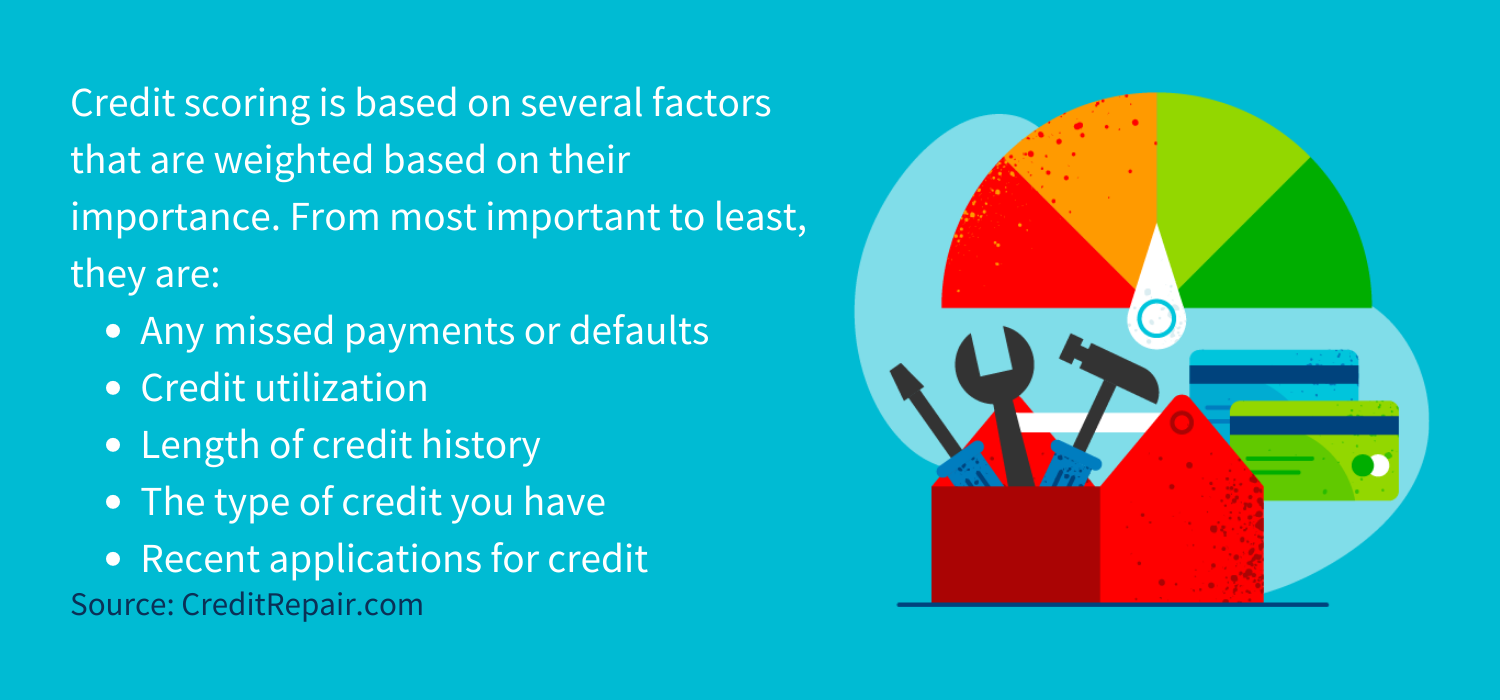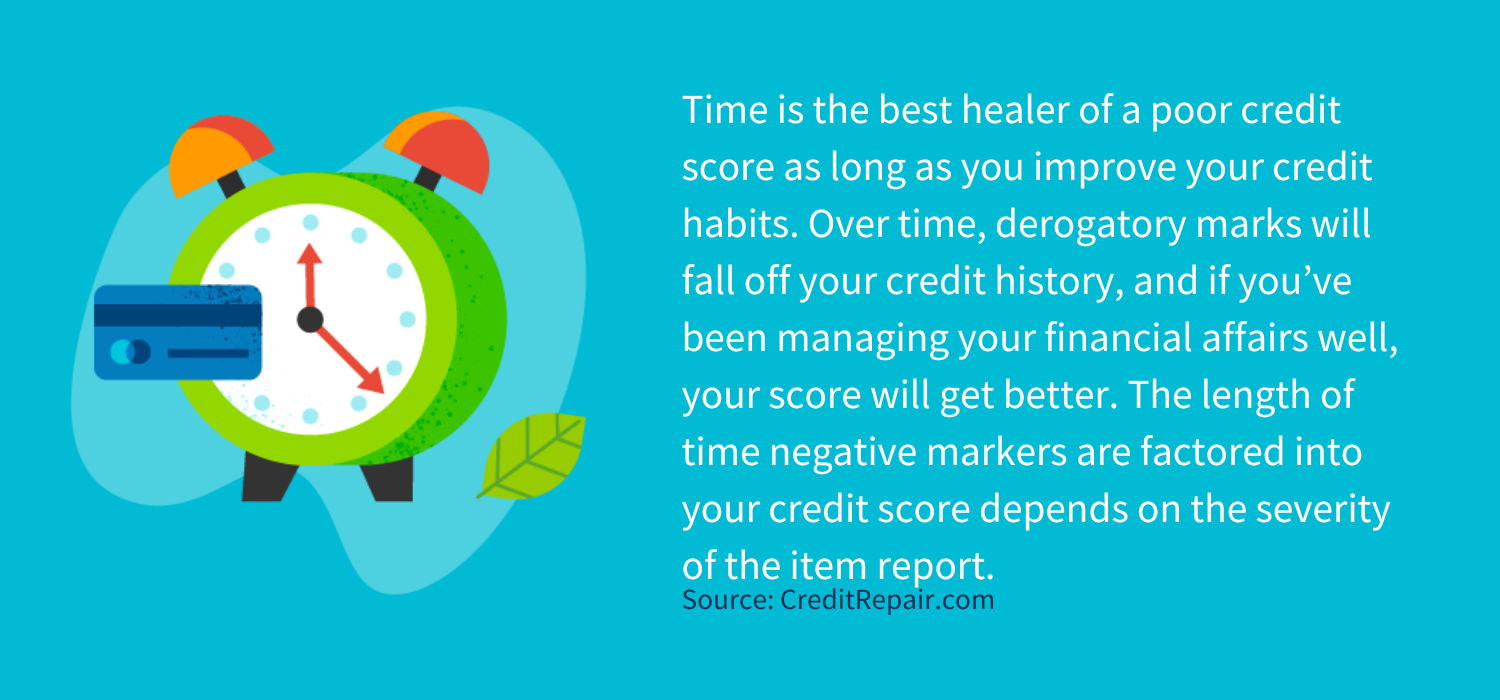
Disclosure regarding our editorial content standards.
Your credit report is used by lenders as an estimate of your creditworthiness, and it can impact whether credit is available to you as well as how much interest you pay. Having a poor credit history can be a significant inconvenience. But how long does it take to improve your credit and potentially raise your credit score?
The answer depends on why you have a poor credit. If you’re just starting and building a credit history for the first time, you could potentially improve your score in a few months. If you have lots of debt, have missed payments or have defaulted on loans, it could take longer to undo that damage.
What is your credit score?
Your credit score is a rating that indicates how well you handle credit. It provides you and your prospective creditors with an at-a-glance overview of your current and past financial status. There are three main credit reporting bureaus:
Each of these uses a slightly different scoring system. For example, a TransUnion score of 600 would be in the Very Poor range, while the same score with Experian would be classed as Fair.
In addition to having different scoring formulas and rating ranges, each credit reporting agency (CRA) may also have access to different information. The USA.gov guide to credit scoring explains these differences and the obligations of the scoring agencies, noting that “each CRA manages its own records and might not have information about all your accounts. Even though there are differences between their reports, no agency is more important than the others. And the information each agency has must be accurate.”
What affects your credit score?

Credit scoring is based on several factors that are weighted based on their importance. From most important to least, credit reference agencies consider the following:
- Any missed payments or defaults
- Credit utilization
- Length of credit history
- The type of credit you have
- Recent applications for credit
How often does your credit score update?
The credit reference agencies recalculate scores whenever companies give them new information to use. Your score is a snapshot of your finances based on the records the credit reference agency has available to them on that particular date.
This means credit scores are a lagging indicator. The banks, utility companies, lenders and other organizations that update your credit file probably don’t do that on a daily basis. Rather, they generally send information to the scoring agencies once a month.
So the payments you make may not be recorded immediately. If you’re subscribed to a free service that provides updates on your credit score once a month, it’s possible that by the time you view your score from that service, the information in the report could be almost two months out of date.
Some services offer to let you see your current credit file, rather than monthly updates. These services give you an idea of what lenders can see.
How long does it take to raise your credit score?
How long it takes to raise your credit score depends partly on how high or low the credit score already is and partly on the factors that contributed to that score. In general, it’s easier for someone to increase a score that’s in the Very Poor or Poor category than it is to repair higher scores.
Recent, minor adverse items on your credit reports such as a 30-day missed payment will likely stop having as much of an impact on someone with a low credit score after nine months of consistent on-time payments. A more serious marker, such as being 90 days in arrears, may take many months to repair.
If your credit score is in the Good or Very Good range, those missed payments will detract from your score for longer, up to three years. The scoring system makes it easy to fall from Excellent or Very Good into the Good range but harder to recover because those scores are reserved for people with low credit utilization and a long history of on-time payments.
Serious adverse markers such as foreclosures or bankruptcies will have an impact on a person’s credit score for several years, although that impact will diminish the closer the marker is to falling off the file for good.
How long do negative items stay on your credit report?

Time is the best healer of a poor credit score as long as you improve your credit habits. Over time, derogatory marks will fall off your credit history, and if you’ve been managing your financial affairs well, your score will get better. The length of time negative markers are factored into your credit score depends on the severity of the item report.
Severe issues can stay on your credit report for up to 10 years:
- Late payments: 7 years
- Foreclosures: 7 years
- Defaulted debts: 7 years
- Chapter 13 bankruptcy: 7 years
- Chapter 7 bankruptcy: 10 years
However, the impact those negative actions have on your credit score may diminish over time. While something like a bankruptcy or foreclosure will have a large impact for several years, one late payment on an otherwise good credit file should have only a small impact on your score if you catch up that missed payment and pay on time going forward.
Once a default or foreclosure falls off your credit report, it’s as if it never happened. The lender that debt was owed to may remember it and use it in their own risk assessments, but other lenders won’t see it on your report.
Simple ways to help raise your credit score
If you have a poor credit score and wish to repair it, the first step is to make sure your finances are in order and you’re paying all your bills on time. Set up automatic monthly payments for every bill that supports them so you don’t miss payments, and start reducing your debts so your credit utilization is lower.
Another way to improve your credit score is to stop applying for new credit. Each time you apply for credit, the prospective lender performs a search for your credit file, and this search is recorded. Other lenders can see that you’ve applied for credit recently. If you’ve made lots of searches in a short period, this could make lenders wonder why you’re suddenly taking out multiple lines of credit.
There are no shortcuts when it comes to erasing the past. However, it’s worth checking your credit report to make sure the information on it is accurate. CreditRepair.com can help you access your credit report and arrange for corrections if there are mistakes on it. Common issues include:
- Incorrect financial associations, such as linking a person to a roommate
- Cases of mistaken identity (for example, someone with a common name having incorrect information on their report)
- Errors caused by lenders or debt collectors incorrectly reporting information
Working with a credit repair agency to question negative actions on your file and make sure any information present is accurate and fair could be the quickest way to improve your credit score, especially for people whose score is at the lower end of the spectrum.
Note: The information provided on CreditRepair.com does not, and is not intended to, act as legal, financial or credit advice; instead, it is for general informational purposes only.
Questions about credit repair?
Chat with an expert: 1-800-255-0263






